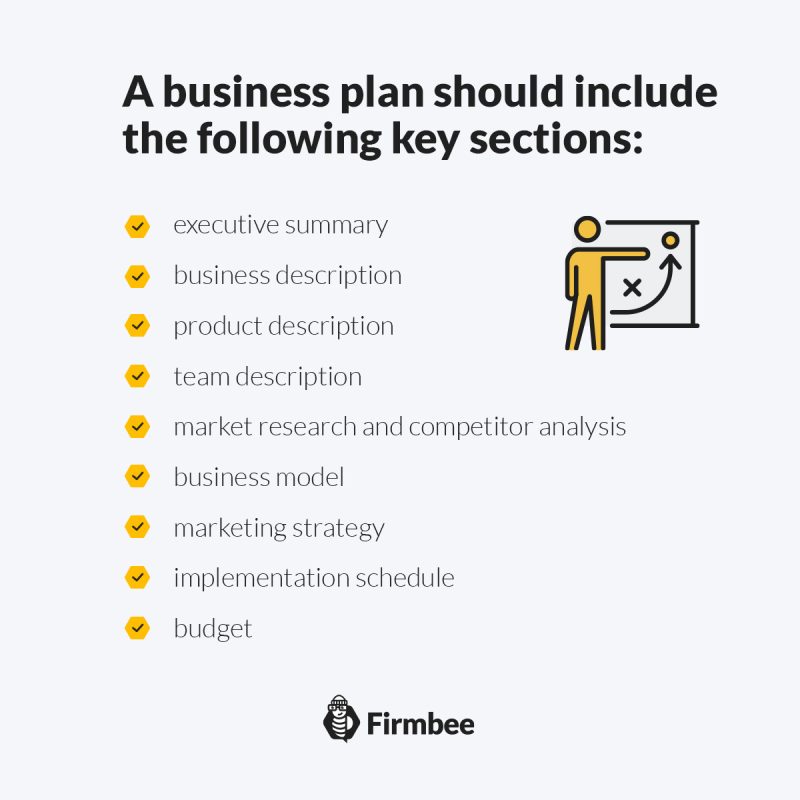Some specialists think that startup founders shouldn’t worry about creating a business plan. Why? Such a plan can age quite quickly, nobody has time to read it, and it’s time-consuming to prepare it. However, it is sometimes necessary for a startup to have such a document. How to prepare a business plan? Why create it? Read on to find out more.
What is a business plan? – table of contents:
- Should you spend time developing a business plan or not?
- What is a business plan?
- What are the objectives of a business plan?
- How long should a business plan be?
- Types of business plans
- What should be included in a business plan?
- Summary
Should you spend time developing a business plan or not?
The aim of every startup is to turn into a profitable business. Every organization needs solid foundations. Even the best startup idea will need a business plan sooner or later. Thanks to such a document, the concept stops being a dream and becomes a reality.
Although many startups do without a business plan, at least to some development stage, such a document is sometimes necessary. For sure, a business plan will be needed when you decide to obtain some external funding. It will also be indispensable when you want to take out a loan from a bank or find an investor.
A business plan is also a solution when you have a problem understanding your target market and prevailing trends in it. Such a document is also necessary when your startup is falling apart when you can’t find a suitable strategy, and you need to do a thorough analysis of the situation.

What is a business plan?
A business plan is a written document that describes the company’s goals, operations, objectives, and strategies. A well-prepared business plan can be essential in pursuing business goals and bringing a product to market. However, it is important to remember that the business plan for a startup is a certain starting point, and the entire plan or its elements may evolve as experience or market knowledge is gained.
A business plan must answer the following questions:
- What is a given startup?
- What objectives does it want to achieve?
- How will it make money?
- What are its long-term objectives?
What are the objectives of a business plan?
Business plans are created for several reasons:
- showing a serious attitude
- setting milestones for startup development
- understanding your competitors
- getting to know customer needs
- business idea validation
- documenting your business income
- defining financial needs
- acquiring investors
- getting a loan from a bank
- market research
- attracting top talents
- defining lines of action
- acquiring shareholders
- brand positioning
- developing a marketing plan
- discovering new possibilities

How long should a business plan be?
It is worth asking how long a business plan for a startup should be. Do you need to write a comprehensive document with all the details, or will some kind of development plan that can be read quickly be enough? In fact, there is no strictly defined number of pages that a business plan should be. It all depends on the specific business venture, its complexity, the size of the business activities, etc.
The most common assumption is that a good business plan for a startup should be between 15 and 30 pages. To this, you need to add about 10 pages for attachments. The font size can be from 11 to 13, and for headings – 18. However, the most important thing is the content of the business plan, not its formatting. It is worth keeping this in mind.
Types of business plans
Business plans can be divided into four types. The first is the so-called mini-plan. It is the most optimal document from the point of view of the audience because it can be read the fastest. It takes little time to prepare and contains key elements only. Such a solution is completely sufficient for small companies with uncomplicated operations. A more complex business model requires a more detailed document.
The second type is actually a presentation plan. This is a short document, usually presented using PowerPoint. It is quite an attractive form of presenting business assumptions. During such a presentation, the speaker discusses all the key business points.
Another type is a working plan. Depending on your needs, it can be long and detailed or concise. If such a plan is intended for internal use, you may skip some of the less important issues in it.
The last type is a pro forma business plan, which is also called a what-if plan. It comes in handy when discussing an unusual market situation, planning an acquisition, etc.
What should be included in a business plan?
A business plan should include the following key sections:
- executive summary
- business description
- product description
- team description
- market research and competitor analysis
- business model
- marketing strategy
- implementation schedule
- budget
What is a business plan – summary
A business plan isn’t always necessary in the case of a startup, but in some situations, it can become indispensable. Such a document most often comes in handy when trying to obtain external financing or make business development activities more dynamic.
We’ve just answered the question: What is a business plan? Other resources: Startup marketing strategy.
If you like our content, join our busy bees community on Facebook, Twitter, LinkedIn, Instagram, YouTube, Pinterest.
Author: Andy Nichols
A problem solver with 5 different degrees and endless reserves of motivation. This makes him a perfect Business Owner & Manager. When searching for employees and partners, openness and curiosity of the world are qualities he values the most.
Launch your startup:
- What is a startup?
- Pros and cons of creating a startup
- 8 best industries for startups
- Top 5 skills every highly successful startup founder needs
- How to create a startup? 7 simple and easy steps
- 6 essential startup development stages
- How to create a startup growth strategy?
- General startup statistics you need to know
- Startup vs. corporate job. Which is right for you?
- 5 incredible companies that started in a garage
- How to find a business idea?
- How to check if your startup idea already exists?
- How to name a startup? Useful tips and strategies
- How to gain business knowledge quickly? 5 best practices
- Why do startups fail? 6 startup ideas you should avoid
- 5 weird business ideas that made millions
- Top 6 most profitable small businesses
- 7 questions to determine if your business idea is worth pursuing
- What is a buyer persona? 5 benefits of creating a buyer persona
- How to validate your business idea? 3 easy steps
- Should you follow your passion? The importance of passion in business
- What is market reseach and why is it important?
- Using social media in business
- What to do when you have too many business ideas?
- How to write a good problem statement for your startup?
- How to test your business idea for real?
- How to create a prototype for a product?
- How to build an MVP?
- How to use surveys for testing your business idea?
- 10 useful tools to validate your business idea
- What is a business plan? 4 types of business plans
- What should be included in a business plan?
- What should a product description include?
- Competitor analysis
- Marketing strategy
- Traditional business plan vs. lean startup plan
- Implementation plan. What is it and how to create it?
- Everything you need to know about patents
- Financial management for startups
- What permits and licenses does my startup need?
- What is the average startup founder salary?
- 4 startup taxes you need to pay
- Which legal structure is best for your business?
- Startup costs. How much money will you need?
- Protection of intellectual property in a startup
- Family funding vs. self-funding
- What is a shareholders’ agreement?
- What should a financial section of a business plan include?


















